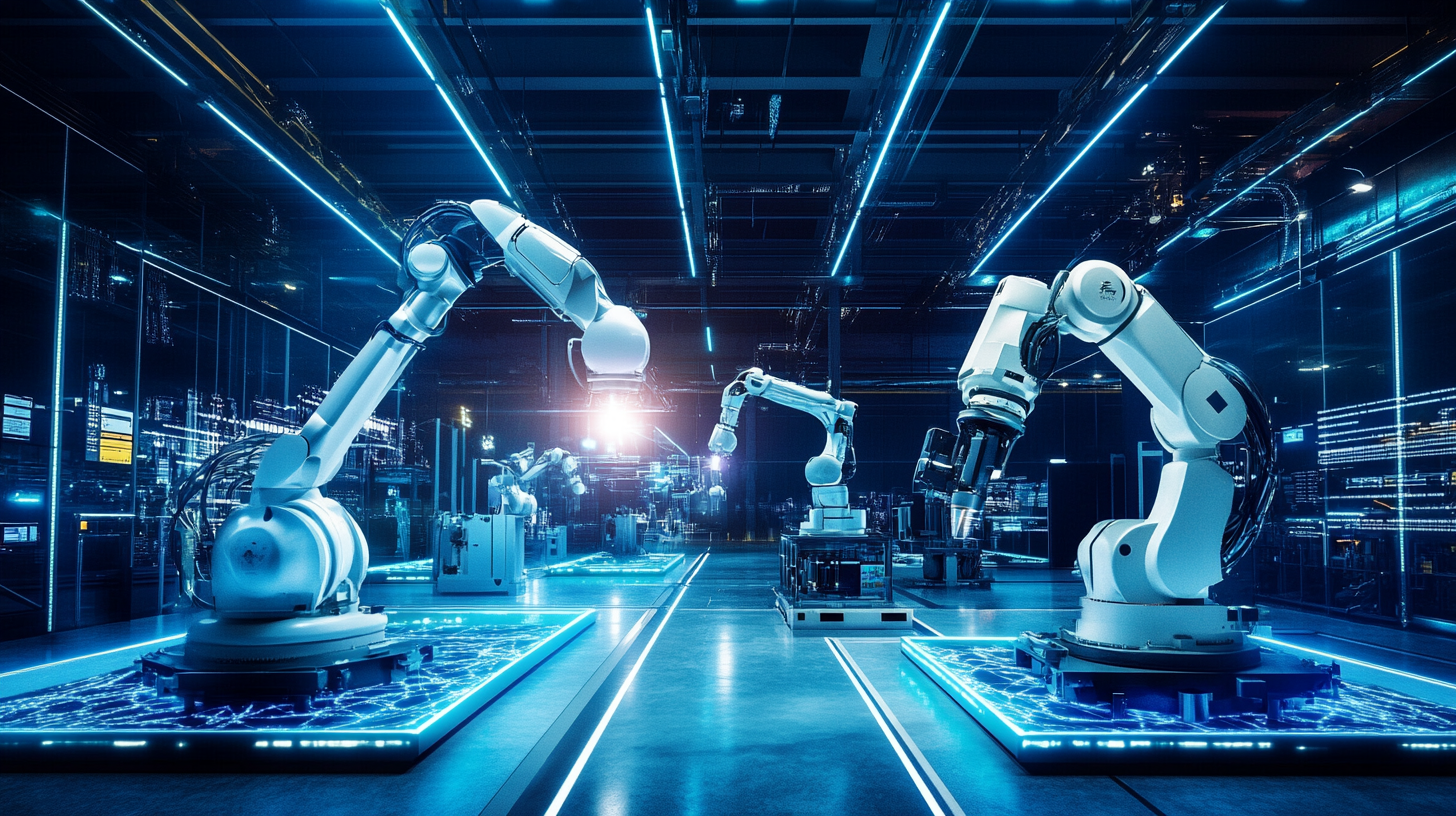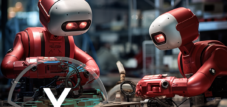
This is how Universal Robots, KUKA, FANUC, ABB and Co. are driving forward the robotics of collaborative robots (cobots) - creative image: Xpert.Digital
💼🤝 Collaborative Robots: The Automation Revolution
⚙️🤖 Collaborative robots, or cobots for short, have revolutionized industrial automation in recent years. These robots were designed to work directly with people without the need for complex protective devices. Cobots represent flexibility, safety and efficiency and offer companies a way to increase their productivity without endangering the safety of employees. In this post, we take an in-depth look at the leaders in cobot development and how they are driving the industry forward.
⭐ Universal Robots: The pioneer of collaborative robotics
Universal Robots, a Danish company founded in 2005, is considered a pioneer in the field of collaborative robotics. With the aim of making robot technology more accessible and user-friendly, Universal Robots has developed a platform that particularly appeals to small and medium-sized enterprises (SMEs). Thanks to their intuitive operation, even companies without extensive technical know-how can easily integrate cobots into their work processes.
The Universal Robots product range includes models that can carry loads between 3 and 20 kilograms. The robots are characterized by quick installation, easy programming and a high level of security, which allows them to be operated in close proximity to human colleagues. With over 50,000 cobots sold worldwide, Universal Robots has consolidated its market leadership in collaborative robots.
"Our vision has always been to make robotics accessible to everyone," a company spokesman describes the mission of Universal Robots. This philosophy is evident in the user -friendliness of its products, which are often considered a yardstick in the industry.
🛠️ KUKA: German precision meets collaborative innovation
The German company KUKA is a heavyweight in robotics and has also established itself strongly in the field of collaborative robots. With a long history in automation, KUKA is particularly active in industries such as automotive production, electronics manufacturing and healthcare.
KUKA's cobots, like the LBR iiwa series, are equipped with highly sensitive sensors that enable precise and safe collaboration with people. Particularly noteworthy is the integration of human-robot interactions in complex production environments, where flexibility and safety are equally important.
“Our collaborative robots are redefining automation and creating solutions that are suitable for both large and small companies,” explains a KUKA representative. The broad applicability and robust technology have made KUKA one of the leading providers in the field of collaborative robotics.
🔧 FANUC: Reliability and AI as trademarks
The Japanese company FANUC is one of the giants of the automation industry and has made a name for itself for its innovative cobots. FANUC offers a wide range of robot models that are known for their reliability and durability. Particularly noteworthy is the integration of artificial intelligence (AI) and machine learning, which enables the cobots to make work processes more efficient and adapt to changing tasks.
FANUC's cobots are widely used in the automotive and electronics industries, where precision and speed are required. Their robots also boast the ability to be seamlessly integrated into existing production lines, saving companies time and resources.
“Our cobots are designed to grow with the future,” says FANUC, describing its vision. By focusing on innovation and adaptability, FANUC has established itself as one of the leading providers in the market.
🛡️ ABB: Advanced sensor technology for maximum safety
The Swiss company ABB is another heavyweight in the automation industry and has secured a place among the market leaders with its expertise in the areas of sensors and electrification. ABB's collaborative robots are known for their advanced safety features, enabling use in a wide range of industries such as food processing, logistics and electronics manufacturing.
One of ABB's best-known product lines is the "YuMi", a cobot that was specially developed for precise and delicate assembly work. Equipped with two arms, YuMi can simulate human movements and perform tasks such as assembling small parts. “YuMi is more than a robot – it is a partner in manufacturing,” emphasizes ABB.
By combining high-tech sensing and intuitive programming, ABB enables companies to make their processes more efficient and safer, making the Swiss company a preferred partner for future-oriented companies.
🌟 Why cobots are the future of automation
Collaborative robotics is more than just a technological trend – it is an essential part of the fourth industrial revolution, also known as Industry 4.0. Cobots offer companies the opportunity to make production processes more flexible and efficient, while improving the safety and well-being of employees.
The main advantages of cobots are:
flexibility
Cobots can be quickly and easily programmed for different tasks, making them ideal for production environments that require frequent changes.
Security
Thanks to advanced sensors and algorithms, cobots can work safely alongside people without the need for complex protective devices.
Cost efficiency
Cobots are often cheaper than conventional industrial robots and also enable small companies to get started with automation.
📈 Growth and outlook for the market
The market for collaborative robots is growing rapidly. According to forecasts, the industry will experience annual growth of over 15% until 2028. This development is driven by increasing demand for flexible automation solutions in industries such as electronics, healthcare and logistics.
Another key factor is the increasing availability of AI technologies that make cobots more intelligent and adaptable. The integration of machine learning and data-based optimization models will further strengthen the role of cobots in manufacturing and beyond.
🚧 Challenges and future developments
Despite the numerous advantages, cobots face some challenges. Integration into existing production lines can be complex, especially in companies that have little previous experience with automation. There is also a need for further developed safety standards and legal frameworks to facilitate the global use of cobots.
Future developments could focus on the following areas:
- Advanced AI functionalities: AI makes cobots even better at handling complex tasks independently.
- Improved mobility: Mobile use of cobots could open up new areas of application, for example in logistics or construction.
- Sustainability: Cobots could help make production processes more environmentally friendly by using energy more efficiently.
Collaborative robotics is only at the beginning of its development. Thanks to innovations from companies like Universal Robots, KUKA, FANUC and ABB, cobots are becoming increasingly intelligent, flexible and safer. They are not just tools, but partners in the modern world of work - and will fundamentally change the way we produce.
📣 Similar topics
- 🤖 Collaborative Robots: A Revolution in Automation
- 🚀 Universal Robots: Pioneer in the field of cobots
- 🇩🇪 KUKA: German precision in collaborative robotics
- 🔍 FANUC: An interplay of reliability and AI
- 🔐 ABB: Maximum safety through advanced sensor technology
- 🌐 Cobots and Industry 4.0: The future of automation
- 📈 Market Trends: The Growth of the Cobot Industry
- 📉 Challenges and opportunities in cobot development
- 💡 Future visions for collaborative robotics
- ⚙️ Productivity and safety: The advantages of cobots
#️⃣ Hashtags: #CollaborativeRobotics #IndustrialAutomation #ArtificialIntelligence #Industry4.0 #Flexibility
Our recommendation: 🌍 Limitless reach 🔗 Networked 🌐 Multilingual 💪 Strong sales: 💡 Authentic with strategy 🚀 Innovation meets 🧠 Intuition
At a time when a company's digital presence determines its success, the challenge is how to make this presence authentic, individual and far-reaching. Xpert.Digital offers an innovative solution that positions itself as an intersection between an industry hub, a blog and a brand ambassador. It combines the advantages of communication and sales channels in a single platform and enables publication in 18 different languages. The cooperation with partner portals and the possibility of publishing articles on Google News and a press distribution list with around 8,000 journalists and readers maximize the reach and visibility of the content. This represents an essential factor in external sales & marketing (SMarketing).
More about it here:
We are there for you - advice - planning - implementation - project management
☑️ SME support in strategy, consulting, planning and implementation
☑️ Creation or realignment of the digital strategy and digitalization
☑️ Expansion and optimization of international sales processes
☑️ Global & Digital B2B trading platforms
☑️ Pioneer Business Development
I would be happy to serve as your personal advisor.
You can contact me by filling out the contact form below or simply call me on +49 89 89 674 804 (Munich) .
I'm looking forward to our joint project.
Xpert.Digital - Konrad Wolfenstein
Xpert.Digital is a hub for industry with a focus on digitalization, mechanical engineering, logistics/intralogistics and photovoltaics.
With our 360° business development solution, we support well-known companies from new business to after sales.
Market intelligence, smarketing, marketing automation, content development, PR, mail campaigns, personalized social media and lead nurturing are part of our digital tools.
You can find out more at: www.xpert.digital - www.xpert.solar - www.xpert.plus

